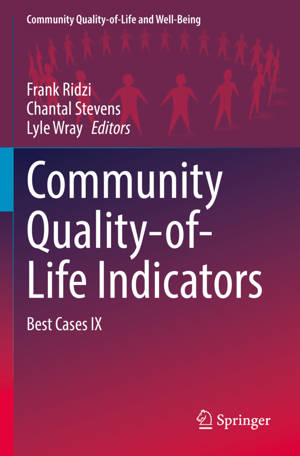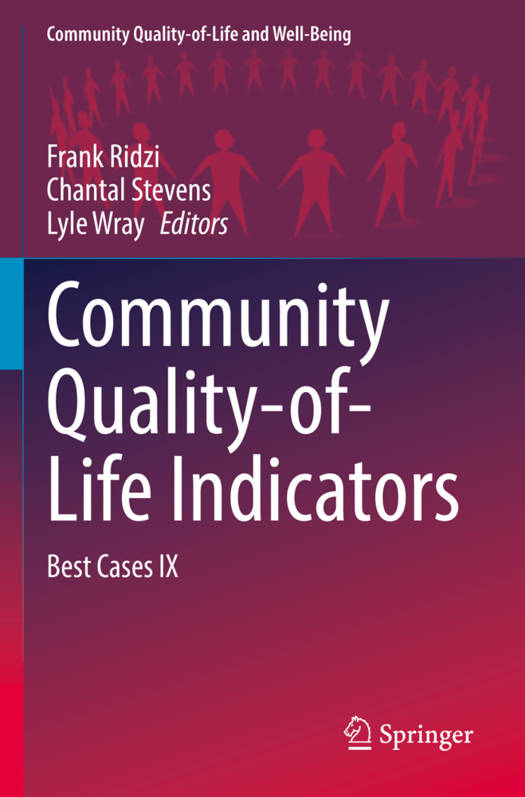
Bedankt voor het vertrouwen het afgelopen jaar! Om jou te bedanken bieden we GRATIS verzending (in België) aan op alles gedurende de hele maand januari.
- Afhalen na 1 uur in een winkel met voorraad
- In januari gratis thuislevering in België
- Ruim aanbod met 7 miljoen producten
Bedankt voor het vertrouwen het afgelopen jaar! Om jou te bedanken bieden we GRATIS verzending (in België) aan op alles gedurende de hele maand januari.
- Afhalen na 1 uur in een winkel met voorraad
- In januari gratis thuislevering in België
- Ruim aanbod met 7 miljoen producten
Zoeken
Community Quality-Of-Life Indicators
Best Cases IX
€ 198,45
+ 396 punten
Omschrijving
This volume continues the tradition now established since 2006, of compiling excellent research into the practice and application of community indicators in a single source volume. It focuses on the theme of the Community Indicators Consortium 2020 Summit, as a significant venue for the advancement of the practice and theory of community indicators work. It covers the conference's theme of "community resilience", which is the capacity of all of a community's elements to survive, adapt, and grow no matter what kinds of chronic stresses and acute shocks they experience.
In keeping with the practical, "best cases" emphasis of this book series, the editors incorporate a case-based approach to chapters discussing how specific indicators, indices or series of indicators can lead to better decisions and outcomes to help communities adapt and transform in the face of challenges, helping them prepare for both the expected and the unexpected to sustain and improve quality of life, including technology and open source approaches to data sharing and data-focussed collaboration; evolving approaches that use shared indicators to improve overall community well-being and quality of life; research related to community indicators and policy, application, research, and/or practice; and techniques and approaches to measure resilience.
This volume is of interest to social scientists, management professionals, social workers and policy makers working on various aspects of community indicators of quality of life and well-being.
Chapter "The Cost of Sea Level Rise for the Island Community of Vinalhaven, Maine: Spurring action through collaborative data analysis" is licensed under the terms of the Creative Commons Attribution 4.0 International License (http: //creativecommons.org/licenses/by/4.0/). For further details see licence information in the chapters.
In keeping with the practical, "best cases" emphasis of this book series, the editors incorporate a case-based approach to chapters discussing how specific indicators, indices or series of indicators can lead to better decisions and outcomes to help communities adapt and transform in the face of challenges, helping them prepare for both the expected and the unexpected to sustain and improve quality of life, including technology and open source approaches to data sharing and data-focussed collaboration; evolving approaches that use shared indicators to improve overall community well-being and quality of life; research related to community indicators and policy, application, research, and/or practice; and techniques and approaches to measure resilience.
This volume is of interest to social scientists, management professionals, social workers and policy makers working on various aspects of community indicators of quality of life and well-being.
Chapter "The Cost of Sea Level Rise for the Island Community of Vinalhaven, Maine: Spurring action through collaborative data analysis" is licensed under the terms of the Creative Commons Attribution 4.0 International License (http: //creativecommons.org/licenses/by/4.0/). For further details see licence information in the chapters.
Specificaties
Betrokkenen
- Uitgeverij:
Inhoud
- Aantal bladzijden:
- 234
- Taal:
- Engels
- Reeks:
Eigenschappen
- Productcode (EAN):
- 9783031069420
- Verschijningsdatum:
- 29/08/2023
- Uitvoering:
- Paperback
- Formaat:
- Trade paperback (VS)
- Afmetingen:
- 156 mm x 234 mm
- Gewicht:
- 344 g

Alleen bij Standaard Boekhandel
+ 396 punten op je klantenkaart van Standaard Boekhandel
Beoordelingen
We publiceren alleen reviews die voldoen aan de voorwaarden voor reviews. Bekijk onze voorwaarden voor reviews.








